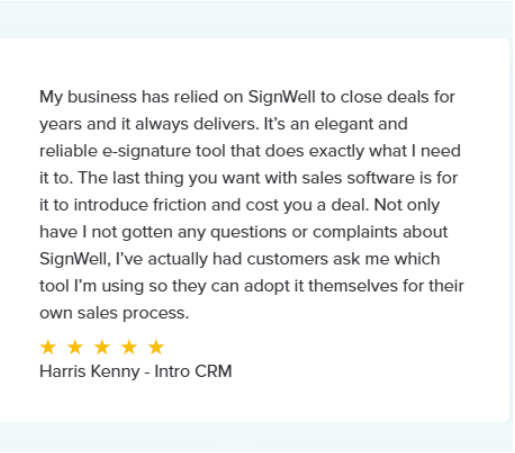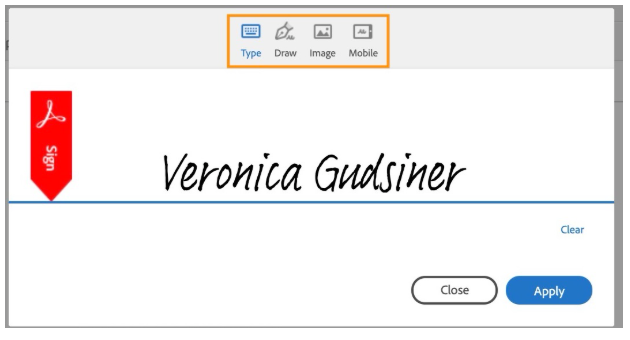Quick Summary
Signatures don’t have to include your full legal name to be valid. What matters most is your intent to sign and consistent identification across documents. Whether you prefer your initials, first name, or a stylized mark, your signature is legally binding when properly authenticated. With SignWell, creating secure, compliant signatures in any format is simple and stress-free. For more e-signature insights, visit our blog.
Does a Legal Signature Have to Be Your Full Name?
If you’ve ever paused before signing a contract and wondered whether you need to write your full legal name, you’re not alone.
Many people assume a valid signature must include their full name to hold up in court or in business. In reality, that’s not the case. What makes a signature valid isn’t how it looks; it’s the intent behind it.
In this article, we’ll explain what legally defines a signature, whether it must include your full name, and how consistency and intent play a bigger role than handwriting style. You’ll also learn how tools like SignWell make it easy to create secure, compliant signatures.
Why Listen to Us
At SignWell, we’ve helped over 65,000 teams manage signature requirements across industries where compliance matters the most like healthcare, finance, law, and government contracting. Our platform processes millions of signatures in every format you can imagine. This experience gives us a clear view of what truly makes a signature legally valid, and helps dispel the common myths that often slow businesses down.

What Are Full Name Signatures?
A full name signature includes your complete legal name as it appears on official identification, usually your first, middle, and last name.
However, modern legal standards focus less on the exact spelling and more on intent and consistent use. This means your signature can take many forms, from initials or nicknames to stylized marks, as long as it clearly represents you and shows your intent to sign.

Does Your Signature Have to Be Your Full Name?
No, a signature doesn’t have to be your full name to be legally valid. Your signature can be your first name only, initials, a nickname, or even a symbol, as long as you intend it to represent your agreement and use it consistently for identification purposes.
What Makes a Signature Legally Binding?
Three elements make a signature legally valid:
- Intent to sign: You must consciously decide to authenticate the document.
- Identity authentication: The signature should reasonably identify you as the signer.
- Document authentication: The signature indicates your agreement with the document’s contents.
These requirements apply equally to handwritten and electronic signatures.
Do Electronic Signatures Need to Be Full Names?
No, electronic signatures follow the same flexibility as handwritten ones. You can use typed initials, abbreviated names, or full names; all have equal legal validity under the ESIGN Act.
SignWell supports all name formats for electronic signatures while ensuring every document stays secure, compliant, and legally binding.
Here’s why electronic signatures are a better fit than using full name requirements:
- Format flexibility: You can use your first name, initials, or even a stylized mark, any format that shows intent to sign.
- Better accessibility: Ideal for anyone who prefers not to handwrite or create elaborate signatures.
- Professional consistency: Keeps every signature neat and uniform across documents, devices, and platforms
FAQs
Can I use just my first name as a signature?
Yes, you can legally use just your first name as your signature. While full names provide better identity verification for important documents, first-name-only signatures are valid if used consistently and with a clear intent to authenticate documents.
What if my name is too long to fit?
Long names can be abbreviated or shortened for signature purposes without affecting legal validity. Many people with lengthy names develop consistent shortened versions that fit comfortably in signature spaces while maintaining recognizable identity markers.
Can married people use maiden names in signatures?
Yes, you can use maiden names, married names, or hyphenated versions in your signature. The key is consistency within each context; use the same name format for related documents or accounts to avoid confusion.
Can I use abbreviated versions of my name?
Abbreviated names are perfectly acceptable for signatures. Common abbreviations like “Rob” for “Robert” or “Liz” for “Elizabeth” work well, especially if you use these versions consistently across your professional and personal document signing.
What if I have multiple legal names?
People with multiple legal names can choose which version to use for signatures, but consistency within each context is important. For example, use the same name format for all banking documents or all employment-related paperwork.
Do banks require full name signatures?
Banks typically don’t require full names but focus on consistency with your signature card. When opening accounts, establish a signature style you can replicate consistently, whether it’s your full name, an abbreviated version, or initials.
Do government forms require full names?
Government forms typically don’t mandate full names in signatures, though they may request your complete legal name in printed form elsewhere on the document. The signature itself can be abbreviated, initials, or your preferred format.
What about business signatures vs personal signatures?
You can use different signature name formats for business versus personal contexts. Many professionals use full names for business documents and abbreviated versions for personal paperwork, maintaining consistency within each category.
Create Legally Valid Signatures with SignWell
Your signature doesn’t need to include your full name to be valid; what matters most is your intent and consistent use. Whether you sign with initials, a shortened version of your name, or a custom mark, your signature carries the same legal weight when properly authenticated.
SignWell makes it easy to create, store, and use legally compliant signatures in any format. With built-in audit trails, secure encryption, and compliance with laws like ESIGN and eIDAS, you can sign with confidence.
Start creating professional, legally binding signatures in minutes. Try SignWell for free today, no credit card required.
Get documents signed in minutes.
Simple, secure, affordable e-signatures
by  .
.
Get Started Today
businesses served
customer support satisfaction
documents signed